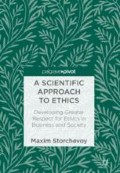Abstract
Is it possible to build ethics like a science? Many ordinary people think that this is impossible because there are too many subjective opinions and disagreements. Many scholars think that this is not necessary and some of them emphasize that there is no true science at all. However, is it so? Can the “impossible” or “unnecessary” theses, be proved? This chapter suggests the opposite. We can and should rebuild ethics as a science. First, it will help to significantly increase its analytical quality and achieve better theoretical progress. Second, it will upgrade the weak status of this discipline in society and business.
Access this chapter
Tax calculation will be finalised at checkout
Purchases are for personal use only
Notes
- 1.
Compare an evidence from about 60 years ago: “Students of ethics are apt to be disappointed to find that, although the subject has been studied for over two thousand years, it does not seem to have produced any established system of truths comparable to those of mathematics and the natural sciences. Why is Aristotle’s Ethics still worth reading, while his Physics is of interest only to scholars and historians?” (Nowell-Smith 1952, p. 15).
- 2.
Moral questions and moral reasoning can be difficult to understand, and we have found that students often hold very skeptical or even cynical views. One hears claims such as, “It’s just a matter of how you feel.” “There’s no rational way to resolve moral disputes. One can only fight.” “Moral claims cannot be true or false.” “Morality is just a matter of social convention or prejudice.” (Hausman et al. 2016, p. 8).
- 3.
- 4.
According to Robert Solomon the majority of textbooks are full of eclectic survey of various approaches and finally “the message to students is too often an unabashed relativism (“if you are a utilitarian, you’ll do this, if you’re a Kantian , you’ll do that”)” (Solomon 1992, p. 318)
References
Alpay, E. 2011. Student-Inspired Activities for the Teaching and Learning of Engineering Ethics. Science and Engineering Ethics 19 (4): 1455–1468.
Børsen, T., A. Antia, and M. Glessmer. 2013. A Case Study of Teaching Social Responsibility to Doctoral Students in the Climate Sciences. Science and Engineering Ethics 19 (4): 1491–1504.
Copp, David, ed. 2005. The Oxford Handbook of Ethical Theory. New York: Oxford University Press.
Hausman, Daniel, Michael McPherson, and Debra Satz. 2016. Economic Analysis, Moral Philosophy, and Public Policy. Cambridge University Press.
Holland, Daniel, and Chad Albrecht. 2013. The Worldwide Academic Field of Business Ethics: Scholars’ Perceptions of the Most Important Issues. Journal of Business Ethics 117 (4): 777–788.
Honderich, Ted, ed. 2005. The Oxford Companion to Philosophy. Oxford University Press.
Kolb, R.W., ed. 2007. Encyclopedia of Business Ethics and Society. Sage Publications.
Nowell-Smith, P.H. 1952. Ethics. London, Penguine Books.
Ozaktas, H. 2011. Teaching Science, Technology, and Society to Engineering Students: A Sixteen Year Journey. Science and Engineering Ethics 19 (4): 1439–1450.
Solomon, Robert C. 1992. Corporate Roles, Personal Virtues: An Aristotelean Approach to Business Ethics. Business Ethics Quarterly 2 (3): 317–339.
Takala, A.J., and K. Korhonen-Yrjänheikki. 2011. A National Collaboration Process: Finnish Engineering Education for the Benefit of People and Environment. Science and Engineering Ethics 19 (4): 1557–1569.
Werhane, Patricia H., and R. Edward Freeman. 2005. The Blackwell Encyclopedia of Management: Business Ethics. Malden, MA: Blackwell.
Zandvoort, H., T. Børsen, M. Deneke, and S.J. Bird. 2013. Editors’ Overview Perspectives on Teaching Social Responsibility to Students in Science and Engineering. Science & Engineering Ethics 19 (4): 1413–1438.
Author information
Authors and Affiliations
Rights and permissions
Copyright information
© 2018 The Author(s)
About this chapter
Cite this chapter
Storchevoy, M. (2018). Why Science? What Science?. In: A Scientific Approach to Ethics. Palgrave Macmillan, Cham. https://doi.org/10.1007/978-3-319-69113-8_1
Download citation
DOI: https://doi.org/10.1007/978-3-319-69113-8_1
Published:
Publisher Name: Palgrave Macmillan, Cham
Print ISBN: 978-3-319-69112-1
Online ISBN: 978-3-319-69113-8
eBook Packages: Business and ManagementBusiness and Management (R0)

